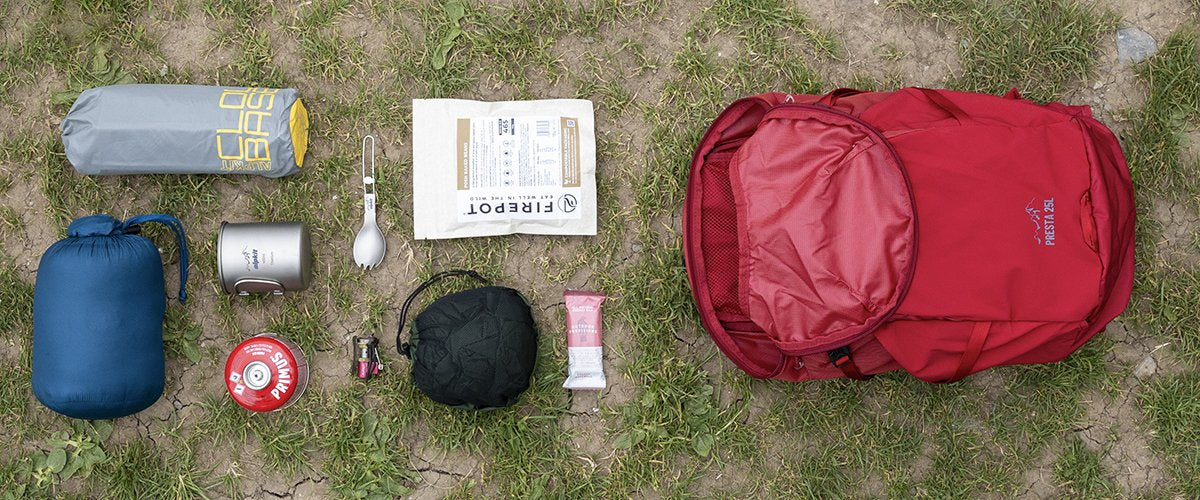
You can get to some pretty cool places if you don't need to back for tea. Imagine if you didn't have to be back till breakfast!
With useable light extending deep into the evenings and warmer nighttime temperatures, Summer opens up a whole new avenue of exploration. But you wouldn't see very much, weighed down with a massive expedition-sized rucksack. Stripping your camping kit right down to the bare essentials means you can cover more ground and get further off the beaten track. Here's how to spend a night outdoors with less than 2kg:
- Pick A Good Night
- Choose The Right Camp Spot
- Take Only What You Need
- Pack Lightweight Gear
- Eat And Drink Smart
- The 2kg Summer Bivvy Kit List

Pick A Good Night
You can get by with surprisingly little kit on a mild, dry summer night. Taking a 2 season summer sleeping bag and a bivvy bag instead of your tent can easily save you a kilogram or two. But conditions can vary dramatically – especially in the British Isles. It’s not unheard of to experience frost in June! Keep your bag packed and an eye on the weather forecast and make a dash whenever the overnight temperatures look warm and dry enough – above 10°C and you should be fine with the below kit list.
Choose The Right Camp Spot
Remember to take elevation and windchill into account – particularly if sheltered sleeping spots could be limited. Most weather forecasting services provide ‘feels like’ temperatures that factor in wind chill. Mountain-specific forecasts like MWIS (Mountain Weather Information Service) and the Met Office’s Mountain Weather also provide temperatures for different elevations. If you can’t find this info for the area you’re going, subtracting 1°C for each 100m of elevation gained will give you a rough temperature guide in clear weather.
Take Only What You Need
Getting everything you think you might need in front of you is a good way of deciding what’s essential, what's only desirable and what's completely unnecessary. Sleeping bag? Absolutely essential. Inflatable pillow? Desirable, but could we make do with a jacket behind our head? Rechargeable camping lantern? Probably won’t be used if we’re in bed by nightfall. Keeping a list of what you took last time and recording what you didn’t need and what you wished you’d taken is a good way to refine your packing list.
Pack Lightweight Gear
This doesn’t mean you have to replace everything in your gear cupboard with space age camping technology! Often, it’s just a case of smart material choices. Opting for an inflatable sleeping mat or a closed cell foam roll mat over a self-inflating mat will save you a good few grams. Titanium cookware combines the strength and durability of steel with the weight advantages of aluminium. High fill power down sleeping bags (750FP and above) still provide the best warmth to weight ratio, even with the availability of quality synthetic alternatives. You can find out more about this in our Spotlight on How to Choose A Sleeping Bag.
Get Food and Drink Smart
Make sure you’re well fed and watered beforehand. You’ll definitely need to carry more food and water with you if you start your evening hungry and dehydrated. Freeze-dried food and dehydrated meal packets give you the best calorie to gram ratio, but only if you don't count the water and gas needed to make them edible! Camping by a clean water source saves you from carrying water with you to boil up for your meal pouch. If you’re starting from the roadside, leave some breakfast and a full water bottle in your car for the morning. Alternatively, you could also plan in a café breakfast if you’re not sleeping anywhere too remote.

2kg Summer Bivvy Kit List
Sleeping
- Pipedream 200 (545g) 750FP Goose Down Sleeping Bag
- Cloud Base (420g) Inflatable camping mat
- Hunka (360g) Waterproof bivvy bag
Cooking
- Kraku (45g) Thumb-sized titanium camping stove
- MytiMug 400 (84g) 400ml titanium cooking pot
- SnapWire Foon (18 g) Folding titanium spork
- Primus Power Gas 100g (198g) 3-season mix camping gas canister
Food and Drink
- Firepot Meal Pouch (135g) Dehydrated meal pouch
- Outdoor Provisions Energy Bar (45g) All-natural energy bar
- Water Bottle 500ml (105g)* BPA-free water container
Total: 1955g
* When empty... 500ml of water weighs 500g... Ok, we may have cheated slightly!
Pack
- Presta 25 (597g) Streamlined 25 litre day pack
